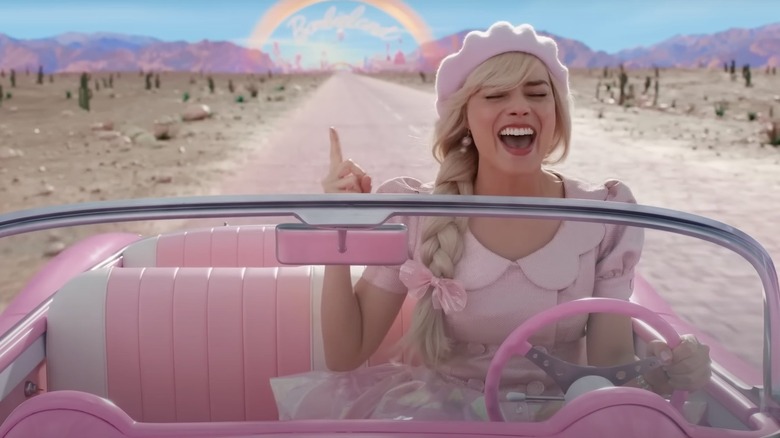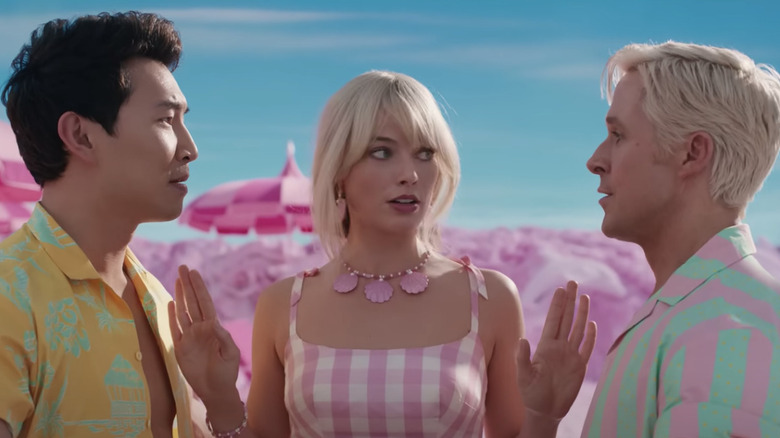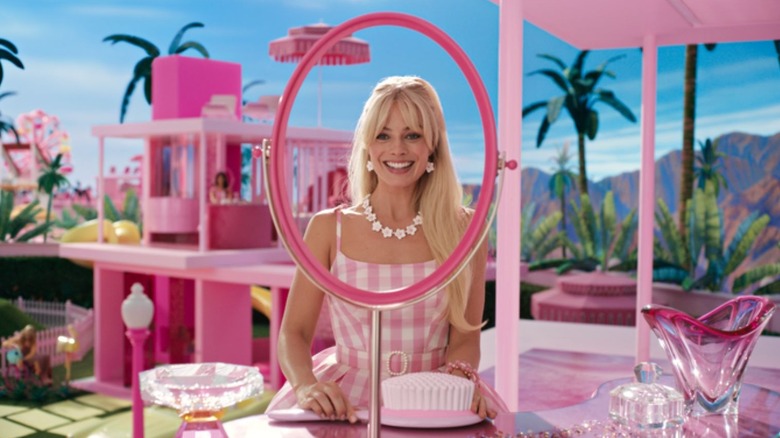For Greta Gerwig, Barbie's Story Unintentionally Mirrored Her Own Journey
The much-buzzed-about "Barbie" might be about a doll, but it's grounded in reality. Director and co-writer Greta Gerwig has often resisted autobiographical themes in her work, even in her debut coming-of-age film "Ladybird," which many thought was loosely based on Gerwig's own adolescence. Without intending it, "Barbie" ended up mirroring the filmmaker's own experiences more closely than "Ladybird" ever did. Even though Gerwig and her co-writer and partner Noah Baumbach avoid drawing directly from their own lives for their material, they can't seem to escape these highly personal touches in their films — even when they don't mean to make them.
The similarities between "Ladybird" and Gerwig's own early life led lots of viewers to believe that Saoirse Ronan's character was meant to be a direct reflection of the filmmaker. Even though Gerwig and Ladybird both grew up in Sacramento and attended catholic school, their similarities more or less stop there.
"Nothing in the movie literally happened in my life, but it has a core of truth that resonates with what I know," Gerwig explained, per Indiewire. "I really wanted to make a movie that was a reflection on home and what does home mean, and how does leaving home define what it is for you and your love for it. I felt like it was a love letter to Sacramento, and I felt like, what better way to make a love letter than through somebody who wants to get out, and then realize that they loved it?"
"Barbie" might be set in the fictional universe of Barbie Land, but in some ways, it mirrors Greta Gerwig's world even more closely than her other films.
The similarities between Barbie and Gerwig are unintentional but real
As Barbie transitions from her own fictionalized universe into the real world, she has to decide whether she is going to become a person or remain an object. In a turning point in her journey of self-discovery, she says "I don't wanna be an idea anymore." This line is reminiscent of Gerwig's own transition from acting in front of the camera in films like Baumbach's "Frances Ha" to working behind the camera on her own films like "Little Women," as Rolling Stone pointed out. Gerwig insists that this comparison "did not occur to [her] at all," but agrees that this analysis is "completely true."
"When you're directing something, you have to be a bit stupid about yourself, or a little bit unconscious," she admitted. The filmmaker finds similarities between herself and her characters in the places she least expected to look.
"[S]o many of the things that are personal that come through your movies are never the things that are the most obvious to you," the writer-director went on. "The things where you really feel unconsciously seen are things like that, where you realize, 'Oh, man, I didn't hide anywhere.' And that's always part of the joy of making art for people, is sometimes they understand it more than you do, which is unsettling."
A lot of the material for Gerwig's films comes from her imagination, but there are also blatant ties to her personal life in each of the three feature films she directed. Even "Little Women," which is adapted from Louisa May Alcott's novel of the same name, was — by Gerwig's own admission — slightly autobiographical.
All of Gerwig's work is a little bit personal
Gerwig's connection to the source material for "Little Women" stemmed from her childhood. The director of the 2019 adaptation formed her own identity as a writer by modeling herself after the March sisters' resident writer, Jo.
"I don't know if I wanted to be a writer, which is why I liked Jo March, or Jo March was a writer so I wanted to be a writer too," she recounted to Time Magazine. "But I did the thing you can only do with books as a child, where your own autobiography and the contents of a book merge."
This time it wasn't Gerwig's autobiography that influenced the content of her film — it was the other way around. The novel had a profound impact on the filmmaker as a child and perhaps even set her on the path of becoming a writer-director in the first place.
Even though Gerwig's own personal narrative is closely related to her films, she is resistant to the label of autobiographical. However, she does admit that her own memories have a profound impact on her art.
"I think about [Frederico] Fellini's Amarcord a lot, and the way you get this sense when you watch it of, 'No, that's not what happened, but that is what that moment felt like,'" the "Barbie" director explained to Little White Lies in 2017. "The way he saw everything is heightened, but it also feels somehow correct. I think I'm interested in personal cinema. Not autobiographical cinema but personal cinema."
Both Barbie co-writers resist being called autobiographical
"Barbie" co-writer Noah Baumbach also prefers the label of "personal" over "autobiographical," as he explained to The New York Times upon the release of his 2019 film "Marriage Story." "I think when people say autobiographical, they're assuming it's one-to-one, which none of my movies are in the slightest," the filmmaker continued. "I might use autobiographical details at times, but any extrapolation beyond that has no meaning to the work or to me or anything else." Baumbach's movies — mostly family dramas like "The Squid and the Whale" — often draw this comparison because they "take place in some version of the real world, so there's a kind of identification," the director added.
But "Barbie" doesn't take place in the real world — at least not entirely — so how do Gerwig and Baumbach's highly "personal" styles fit into such a heavily stylized world? "I'm always interested in the way fiction — and, in a way, lies — can serve a greater truth in art," Gerwig told Little White Lies. "I guess one way to see it is fiction, and another way to see it is lies. But, to go back to Fellini, he says, 'All art is autobiographical. The pearl is the oyster's autobiography.'"
Fans might find traces of Gerwig and Baumbach's personal lives in their films — but don't expect to find many Taylor Swift-style Easter eggs in "Barbie." "In a way, and maybe it's because I make films, I don't have too much of a fascination with whether or not something is quote-unquote true," the "Barbie" director went on. "When I watch movies I don't think of it that way, I don't want to go to Wikipedia and see what matches up."



